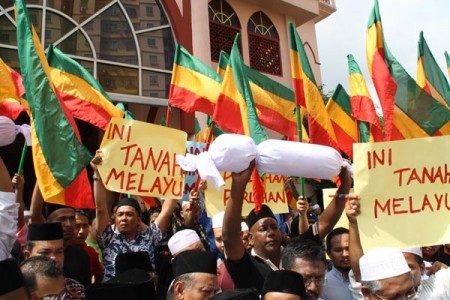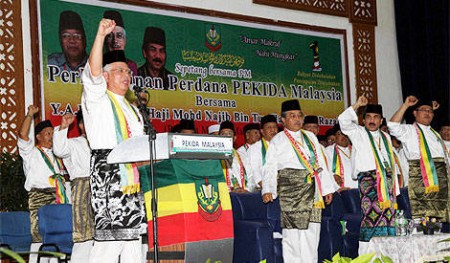What if the liberalisation of the public sphere since the Mahathir era paved the way for the emergence of civil surrogates of political parties? What if the so-called “civil society” was used as a veil to hide and promote the rise of militants who are in fact sub-contractors of political parties discourse and actions?
This four part article challenges the general conception of Malaysian politics through the exploration of the relationship between opportunist militant groups or gangs, and political parties. Built on 5 years extensive field-research (from 2008 to 2013) that consisted of ethnographic type interviews and observations in peninsular Malaysia, this analysis is premised on the narrative of individuals who claim their membership to gangs affiliated or satellites of the non-governmental organisation Pekida.
Illusory democracy
The democratisation process that followed Mahathir’s resignation in 2003 transformed Malaysia from an authoritarian state to an “illusory democracy” and reshaped the Malaysian public sphere, promoting the rise of new actors. Despite the perpetuation of authoritarian laws and other legal boundaries, the liberalisation process strengthened non-governmental organisations (NGOs) by providing them an opportunity to play a more active and direct role in politics.
At the beginning of the Abdullah Badawi era, Malaysia witnessed a relative opening of the public sphere. The ambition of Abdullah Badawi and his successor Najib Razak was to create a rupture with the regime of their predecessor and to transform the image of Malaysia as marching towards democracy – at least in appearance. Despite regular arrests of opposition activist and bloggers; muzzling of the press and publications deemed pro-opposition and the use of repressive laws such as the Internal Security Act (ISA), the Sedition Act and the Printing Press and Publication Act has been minimised in comparison to the Mahathir era. As NGO voices became louder, non-governmental entities representing different interests mushroomed and street demonstrations became routine. From 2003 onwards, the public demand for democratic reforms among which included the removal of repressive laws and the revision of the socio-political and economic privileges given to Malays, a message conveyed by NGOs and the media, increased tremendously. The public space was filled with debates and controversies that led to massive and recurrent public demonstrations and forums. During these events, whenever United Malays National Organisation (UMNO) supporters were identified for their violent or excessive behaviour, they were reported as allegedly being members of UMNO Youth (Pemuda UMNO).
It was only in the wave of the 2008 elections tsunami that pro-UMNO shadowy organisations, other than those directly affiliated to the party, appeared clearly to public eyes. Most are believed to be an element of the ethnonationalist movement, or pro-Malay movements supporting government politics. A majority of these groups are registered NGOs supporting UMNO policies within the government’s while denouncing the opposition’s tendency to challenge Malay special rights and authoritarian laws. At the same time these organisations were attacking the government for suggesting or initiating reforms to Malay privileges or authoritarian laws. These groups appeared as fervent defenders of the most extreme right-wing UMNO rhetoric and were thus qualified as “ultra-Malay”. Rumours relayed by the alternative media and blogs started to portray Pekida as the most secretive and violent of these self-proclaimed defenders of the Malay community and Islam.
A system of connivance
Connivere or “to close the eyes” is at the origin of the word “connivance”. The expression implies a notion of sympathy or approval, a notion of secret, and a notion of illegality or the underground. Thus we may understand connivance as an approval or a passive consent of wrong-doing. Connivance is indeed the cornerstone of the “Malaysian system”, a ground where actors who may have different interests secretly collaborate in order to cultivate their power. They master the art of illusion in order to hide their connivance, to look impartial and independent, instilling trust among the people they create this illusion for.
The literature rarely depicts the Malaysian system as a whole but rather separates the entities, or exposes dual linkages (like business and politics or politics and civil society), and has yet to present the spheres of powers as a trio. This Malaysian system is characterised by the connivance of powers; an intricate relationship existing between political, social and economic actors. Visually, this system constitutes a trio of intertwined spheres of actors, which play an active role in the design of contemporary politics. The political sphere encompasses political parties: including the ruling party, the government and state institutions. The economic sphere is that of entrepreneurship, of private and publicly listed companies: it is the “corporate world”; while the public sphere is composed of NGOs and other members of the “civil society”, and the media. The structure of the Malaysian political theatre sets the lines along which the game of politics is played, and the way individuals (or groups of individuals) act in, out, or across the spheres. The porous nature of the spheres is one of the specificities of this system, enabling political actors or individuals to play one or more roles. For example, ruling party politicians sit on the board of private and public listed companies and mainstream media (print, audio and visual) that are run by companies owned by leaders of the component parties (or their proxies) that make up the ruling coalition. “Business politics” or patronage is one of the pillars of the Malaysian political system and refers to a long running relationship between the political and the business spheres.
Connivance militancy is a secret, if not unofficial, political arrangement by which a formal political actor (i.e. a political party, a government or a politician) sub-contracts legal and/or illegal political acts to serve its interests. These activities range from advocacy to demonstrations, and violence directed at groups or individuals. Connivance militants can be seen as entrepreneurs of mobilisation and/or violence who offer their services in exchange for money or advantages, and thus become informal political actors. In the Malaysian context, connivance militants represent the “muscle” and “numbers” a formal political actor may need when challenged by opponents during every occasion of political life: elections, campaigns, demonstrations, controversies, etc.
A shadow play
Pekida is a complex and loose network of discreet NGOs created by gangs for which political militancy is a business. These gangs are opportunist militant group. Pekida is indeed a generic name used to describe this network, but in reality the name “Pekida” is the name of one of the numerous NGOs created by this network to offer political support and legalise parts of their activities.
In December 2011, in Shah Alam, the dominantly Malay capital of the State of Selangor; current Prime Minister Najib Razak, attended the annual meeting of Pekida. Najib’s promise of governmental aid in exchange for political support from the members were seen by the alternative media as an endorsement of the ethno-nationalist discourse of UMNO and Pekida. In this pre-electoral context (one year before the 13th general elections), the prime minister’s move of being seen as endorsing Pekida‘s “ultra-Malay discourse” and alienating moderates in Malaysia was simply too significant to ignore. Indeed this move was the first (and long awaited) public sign of a change of allegiance of these groups from Abdullah to Najib; and the revelation of a new connivance for a leader in need of support.
Continued in Part 2, “Gangsta to the roots: Gangsta through the years.”
Sophie Lemière is the Jean Monnet Postdoctoral Fellow at the European University Institute, Florence, Italy. She holds a PhD and a Masters in Comparative Politics from Sciences-Po (France). She is the author of Misplaced Democracy: Malaysian Politics and People.
 Facebook
Facebook  Twitter
Twitter  Soundcloud
Soundcloud  Youtube
Youtube  Rss
Rss 
